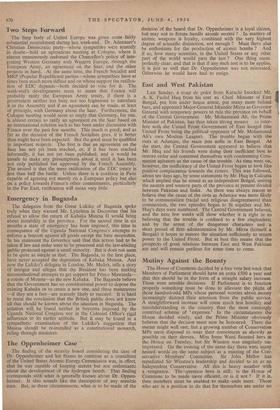Two Steps Forward
The limp body of United Europe was given some fairly substantial nourishment during last week-end. Dr. Adenauer's Christian Democratic party—whose sympathies were scarcely in doubt—held an uproarious meeting at Cologne, where it almost unanimously endorsed the Chancellor's policy of inte- grating Western Germany with Western Europe, through the European Army, an agreement on the Saar, and the other projects in hand. At the same time, the French Socialist and MRP (Popular Republican) parties—whose sympathies have at times been much more diffuse and on whose support the ratifica- tion of EDC depends—both decided to vote for it. The week-end's developments seem to mean that France will probably ratify the European Army treaty, if there is a government neither too busy nor too frightened to introduce it in the Assembly and if an agreement can be made, at least of principle, with Germany about the Saar. Furthermore, the Cologne meeting would seem to imply that Germany, for one, is almost certain to ratify an agreement on the Saar based on an international solution such as has been under discussion with France over the past few months. This much is good; and as far as the decision of the French Socialists goes, it is better than might have been expected. But the good must be qualified in important respects. The first is that an agreement on the Saar has not yet been reached, or, if it has been reached informally, it has not yet been published; and it would be unsafe to make any presumptions about it until it has been not only published but approved by the French Assembly. The second is that the mere ratification of the EDC treaty is less than half the battle. Unless there is a coalition in Paris Capable of agreeing not merely on a European policy but also On a policy towards France's other commitments, particularly in the Far East, ratification will mean very little.


































 Previous page
Previous page